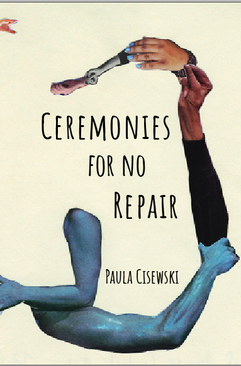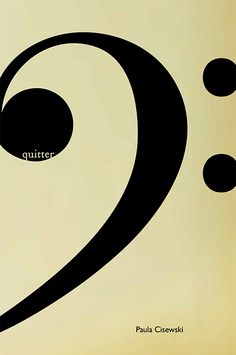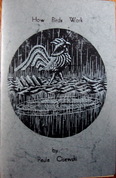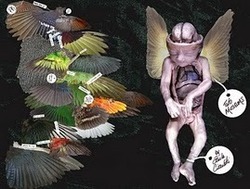|
Ceremonies for No Repair
Purchase here. "Night skull elegy, matrilineal pandemic pillow book, harrowing florilegium, red-threaded unbinding spell, Paula Cisewski's Ceremonies for No Repair descends into the mouth of the lion called care. Down its milky throat and once thought. Into its green heart of radiant grief. Teeth of the lion a crown of sonnets on a queen of sorrow and strength, these are ceremonies to remember unraveling in the time of Mother Corona, to abracadabra the difficult act of keeping oneself alive letter by letter by bearing witness to the cords that once bound, now dissolved." -Elisabeth Workman "The inclusion of art and of the footnotes, and of the diary-like material alongside poems creates this vision of Cisewski's artistic process and radiates outward to echo the artistic processes of others: like THIS IS WHAT ART IS: these are the materials. This is how we transform the shit into flowers. It's really powerful as it accumulates across the book." -Danika Stegeman |
|
Quitter
2016 Diode Editions Book Prize Winner. Purchase here. "In quitter, Paula Cisewski quits everything except doubt, the kind of cavernously honest doubt that philosophers crave and that the American Project will need to forge as its lodestone if this planet is to continue. Only someone doing it (Poetry) right could ask, “how can I / possibly be / doing this right,” illuminating the difficult path with humility and care. For what but “an earnest / straining to hear / will return the here / to the here.” quitter slips into the labyrinth for its dark heart, for its beastliness, but it escapes with something far greater: light. “Whatever light there is, that’s what it’s time for.” This is a book about labor and refusal. We the people, more than ever, need poets like Paula to walk and work the labyrinth for us, to refuse easy answers and bring back seeds of resistance. I am so grateful for this timely, intimate, and incandescent book." --Chris Martin "Paula Cisewski's latest book is full of labyrinths and scavengers, blossoms and bus commutes, Shakespeare and Chopin and Bowie and Husker Du. Reading it is like commiserating over the end of the world with your smartest friend, only to realize, after a night of dark humor and etudes, that you're just at the halfway point." --Kate Harding |
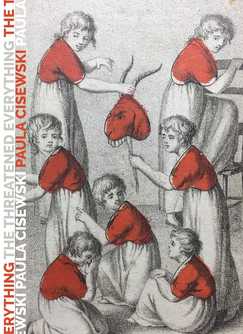
The Threatened Everything
2014 Burnside Review Press Book Prize Selected Finalist.
Purchase here.
I am delighted by Cisewski’s formal virtuosity and her feverish humor, and I’m scared to death—as one
should be—by the accuracy of her apocalypse. ‘We gravel-knee our motherland,’ she writes. ‘We are
patriots, Sisters and Brothers, and our country’s flag is a gaping beak.’ This book’s arrival is imperative,
urgent. It burns.” --Diane Seuss
“How can you question what is holy without terrifying everyone? ‘Who doesn’t yearn to crush / a dour
economy of habit?’ Paula Cisewski poses these questions to selves in various states of duality: the
mother losing her child to adulthood, the newlywed. This book is an everything of wolves and hate-
rallies and baby boys and jokes. It asks: If everything is threatened, what can you care about? If life is
a joke so sick you joke about it…would you? I love these questions. I question these loves. This is a
great book of poems. --Sommer Browning
"The Threatened Everything takes a heart-stoppingly honest look at the lies we tell ourselves in order to be functioning grown-ups. Writing poems both timely and marked by a deep, ancient wisdom born from the marriage of absurdity and grief, Paula Cisewski emerges as an American inheritor of the great Polish poets Zbigniew Herbert and Czeslaw Milosz. With a studious music and a sharp eye for laughter’s dual power to demand both complicity and joy in our separated, secular lives, her poems mark out space for us to gather our strength and see more clearly the things of the world that center and unhinge us, despite the distracting flotsam and jetsam of late capitalism, the war machine, the political circus. --Mary Austin Speaker
2014 Burnside Review Press Book Prize Selected Finalist.
Purchase here.
I am delighted by Cisewski’s formal virtuosity and her feverish humor, and I’m scared to death—as one
should be—by the accuracy of her apocalypse. ‘We gravel-knee our motherland,’ she writes. ‘We are
patriots, Sisters and Brothers, and our country’s flag is a gaping beak.’ This book’s arrival is imperative,
urgent. It burns.” --Diane Seuss
“How can you question what is holy without terrifying everyone? ‘Who doesn’t yearn to crush / a dour
economy of habit?’ Paula Cisewski poses these questions to selves in various states of duality: the
mother losing her child to adulthood, the newlywed. This book is an everything of wolves and hate-
rallies and baby boys and jokes. It asks: If everything is threatened, what can you care about? If life is
a joke so sick you joke about it…would you? I love these questions. I question these loves. This is a
great book of poems. --Sommer Browning
"The Threatened Everything takes a heart-stoppingly honest look at the lies we tell ourselves in order to be functioning grown-ups. Writing poems both timely and marked by a deep, ancient wisdom born from the marriage of absurdity and grief, Paula Cisewski emerges as an American inheritor of the great Polish poets Zbigniew Herbert and Czeslaw Milosz. With a studious music and a sharp eye for laughter’s dual power to demand both complicity and joy in our separated, secular lives, her poems mark out space for us to gather our strength and see more clearly the things of the world that center and unhinge us, despite the distracting flotsam and jetsam of late capitalism, the war machine, the political circus. --Mary Austin Speaker
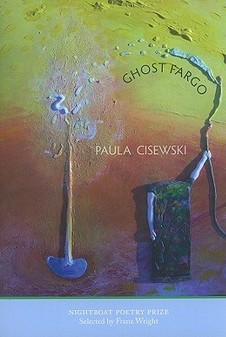
Ghost Fargo
Purchase here.
2008 Nightboat Poetry Prize Winner, selected by Franz Wright.
2010 Coldfront Top 10 Best Second Books.
2011 Grub Street Book Prize Finalist, selected by Elisa Gabbert. Read her review here.
"The storied inland realm of Fargo is here laid out for us in what I might call a geological elegy--a lament for the land and the sea so long ago abandoned, leaving behind a loss haunted by the dead and felt by the living. Each word in this book seems to reverberate with that delicate haunting as we learn how these simple words (geology, elegy) ghost each other." --Eleni Sikelianos
"Paula Cisewski says 'Kiss my pathos,' and that's exactly what you want to do when you read this book. Her personal city -- Ghost Fargo -- is part American dystopia, part formal experiment, and an emotionally vivid interior landscape. When I read her I feel like she's talking to me; her voice is hilarious, sad and clear."
--Matthew Rohrer
"If nothing else we have, each one of us, the solitary and unacknowledged duty of witnessing, throughout our lives, in a way no one else possibly could, the absence of our own many past selves. Paula Cisewski speaks from and of this solitary unpaid job with great poignancy and ravishing technical skill. Her book has the desolate mystery and beauty of winter in the American midwest, along with the strange, hard-won hilarity of that place, any human place really. In the end that humor may be all we have to stay alive." -- Franz Wright
Purchase here.
2008 Nightboat Poetry Prize Winner, selected by Franz Wright.
2010 Coldfront Top 10 Best Second Books.
2011 Grub Street Book Prize Finalist, selected by Elisa Gabbert. Read her review here.
"The storied inland realm of Fargo is here laid out for us in what I might call a geological elegy--a lament for the land and the sea so long ago abandoned, leaving behind a loss haunted by the dead and felt by the living. Each word in this book seems to reverberate with that delicate haunting as we learn how these simple words (geology, elegy) ghost each other." --Eleni Sikelianos
"Paula Cisewski says 'Kiss my pathos,' and that's exactly what you want to do when you read this book. Her personal city -- Ghost Fargo -- is part American dystopia, part formal experiment, and an emotionally vivid interior landscape. When I read her I feel like she's talking to me; her voice is hilarious, sad and clear."
--Matthew Rohrer
"If nothing else we have, each one of us, the solitary and unacknowledged duty of witnessing, throughout our lives, in a way no one else possibly could, the absence of our own many past selves. Paula Cisewski speaks from and of this solitary unpaid job with great poignancy and ravishing technical skill. Her book has the desolate mystery and beauty of winter in the American midwest, along with the strange, hard-won hilarity of that place, any human place really. In the end that humor may be all we have to stay alive." -- Franz Wright
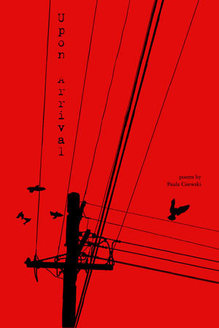
Upon Arrival
Black Ocean, 2006. Purchase here.
"Paula Cisewski loves language. Language and metaphor in the face of human heartbreak and desire....Such a refreshing, distinctive first book of poems." --Ralph Angel
"The verbal search for unknown finality is in these poems, the odd little bird who cocks her head to the side while singing to herself is in these poems, and the sound of circulating blood, and all manner of edgy fragile other things that make the reader feel lucky–for listening is inherently lucky, and these poems bear that gift"
--Mary Ruefle
"Cisewski introduces herself as a feisty and bright writer who embraces her flaws as elements of a jaded
perfection…" --Verse Magazine
Black Ocean, 2006. Purchase here.
"Paula Cisewski loves language. Language and metaphor in the face of human heartbreak and desire....Such a refreshing, distinctive first book of poems." --Ralph Angel
"The verbal search for unknown finality is in these poems, the odd little bird who cocks her head to the side while singing to herself is in these poems, and the sound of circulating blood, and all manner of edgy fragile other things that make the reader feel lucky–for listening is inherently lucky, and these poems bear that gift"
--Mary Ruefle
"Cisewski introduces herself as a feisty and bright writer who embraces her flaws as elements of a jaded
perfection…" --Verse Magazine
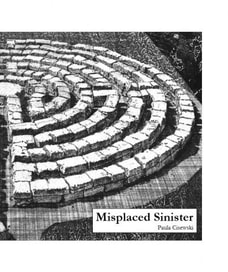
Misplaced Sinister
Red Bird Chapbooks, 2015. Out of print.
Cisewski’s new chapbook of lyric prose, Misplaced Sinister, explores family relationships, mythology, and cultural systems of punishment, using poetic sensibilities to amplify a highly charged narrative.
"Misplaced Sinister is a refusal of...illusion, a determination to inhabit a space of partial knowledge, of wrong-handedness, of stories told and retold--to live in the presence of an absence."
--Rain Taxi Review of Books
